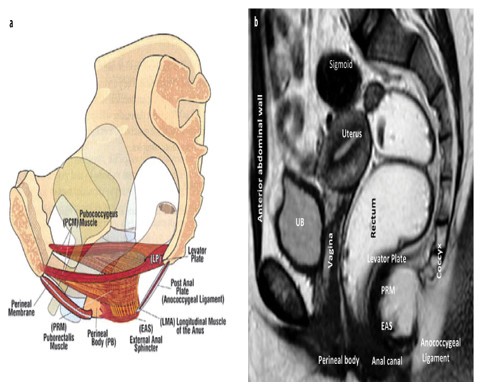Fielding jr griffiths dj versi e mulkern rv tee mlt jolesz fa.
Pelvic floor insufficiency radiology.
It is a cause of chronic pelvic pain in approximately 13 40 of women.
Varicose veins are veins that become swollen.
The disease process was previously referred to as pelvic congestion syndrome however the term pelvic venous insufficiency identifies the root cause and is the newer terminology.
Pelvic venous congestion syndrome is also known as ovarian vein reflux.
In this article we focus on imaging pelvic vein insufficiency and related extending varicosities.
Authors have used different filling media such as sonographic gel mashed potatoes variably mixed with a gadolinium compound according to the signal intensity intended to obtain in the t1 or t2 weighted sequences.
Dynamic mr imaging of the pelvic floor performed with patient sitting in an open magnet unit versus with patient supine in a closed magnet unit.
Pelvic floor failure is a common disorder that affects 23 7 of women in the united states with a prevalence of 9 7 49 7 that increases with age one in nine women will undergo an invasive procedure for treatment of urinary incontinence or pelvic organ prolapse with 30 requiring additional surgery for symptom recurrence by 80 years of age.
Venography is primarily carried out for treatment purposes before embolization.
Chronic pelvic pain is pain in the lower abdomen which has been present for more than 6 months.
How should we evaluate the pelvic veins what are the signs to.
The diagnosis of pelvic venous insufficiency is therefore essentially a clinical exercise that is supported by radiology findings.
Your pelvic floor is the group of muscles and ligaments in your pelvic region the pelvic floor acts like a.
Diagnostic imaging of pelvic congestive syndrome.
Pelvic congestion syndrome pcs is a chronic condition that occurs in women when varicose veins form below the abdomen within the pelvic region.
Pelvic floor dysfunction is the inability to control the muscles of your pelvic floor.
Mr imaging of pelvic floor continence mechanisms in the supine and sitting positions.
That extend from the leg through the pelvic floor which should be evaluated for the presence of pelvic congestion syndrome.
The term pelvic congestion syndrome specifically refers to the condition first described by louis alfred richet in 1857 and characterized by chronic dull pelvic pain pressure and heaviness that persist for more than 6 months with no other cause.
The imaging examinations also allow other causes of cpp to be excluded.
223 501 508 google scholar 17.

